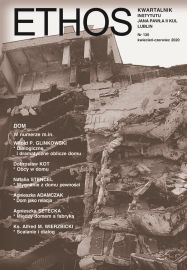„CZŁOWIEK RODZI SIĘ DLA ROZKWITU”
„CZŁOWIEK RODZI SIĘ DLA ROZKWITU”
Wizja domu w poemacie Karola Wojtyły „Wędrówka do miejsc świętych”
Author(s): Dorota HawrylukSubject(s): Theology and Religion
Published by: Katolicki Uniwersytet Lubelski Jana Pawła II - Instytut Jana Pawła II, Wydział Filozofii
Keywords: home; homelessness; relationship; Abraham; Cross; Holy Land; Wojtyła; poem
Summary/Abstract: This sketch is an attempt to interpret the vision of home as presented in Karol Wojtyła’s Journey to the Holy Places (Polish: Wędrówka do miejsc świętych), a poem refl ecting on his pilgrimage to the Holy Land which ended the Third Session of the Second Vatican Council in November 1964. What makes this composition in verse so remarkable is its fi ve-part structure, within which the experiences gathered during the pilgrimage do not create an impression that the author imposes his subjective impressions on the holy places; rather, they refl ect a creative effort to explore the inner character of these places, and thus to unravel the real identity of each of them. The lyrical subject’s expressly manifested spiritual and doxological attitudes can be viewed as a hint to interpret the poem through the prism of responsibility for the deposit of faith and the correctly understood apostolate. Wojtyła’s vision of home revolves primarily around the issue of the Saving Work of Christ, through which the world became a real home, and people were restored access to their profound fi lial relationship with God. In this context, the numerous explications of Biblical and doctrinal motifs are integrally connected with the affi rmation of human subjectivity and provide a great source of inspiration for spiritual development. Therefore, the presented concept leads to the idea of homelessness as a lifestyle devoid of its inner divine order.
Journal: Ethos. Kwartalnik Instytutu Jana Pawła II KUL
- Issue Year: 33/2020
- Issue No: 2
- Page Range: 197-225
- Page Count: 28
- Language: Polish
- Content File-PDF

